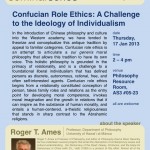 In the introduction of Chinese philosophy and culture into the Western academy, we have tended to theorize and conceptualize this antique tradition by appeal to familiar categories. Confucian role ethics is an attempt to articulate a sui generis moral philosophy that allows this tradition to have its own voice. This holistic philosophy is grounded in the primacy of relationality, and is a challenge to a foundational liberal individualism that has defined persons as discrete, autonomous, rational, free, and often self-interested agents. Confucian role ethics begins from a relationally constituted conception of person, takes family roles and relations as the entry point for developing moral competence, invokes moral imagination and the growth in relations that it can inspire as the substance of human morality, and entails a human-centered, a-theistic religiousness that stands in sharp contrast to the Abrahamic religions.
In the introduction of Chinese philosophy and culture into the Western academy, we have tended to theorize and conceptualize this antique tradition by appeal to familiar categories. Confucian role ethics is an attempt to articulate a sui generis moral philosophy that allows this tradition to have its own voice. This holistic philosophy is grounded in the primacy of relationality, and is a challenge to a foundational liberal individualism that has defined persons as discrete, autonomous, rational, free, and often self-interested agents. Confucian role ethics begins from a relationally constituted conception of person, takes family roles and relations as the entry point for developing moral competence, invokes moral imagination and the growth in relations that it can inspire as the substance of human morality, and entails a human-centered, a-theistic religiousness that stands in sharp contrast to the Abrahamic religions.
Philosophy Seminar Series.
Date: Thursday, 17 Jan 2013
Time: 2pm – 4pm
Venue: Philosophy Resource Room (AS3 #05-23)
Speaker: Roger T. Ames, Professor, Department of Philosophy, University of Hawai’i at Mānoa
Moderator: Dr. Ben Blumson
About the Speaker:
 Roger T. Ames is Professor of Philosophy and editor of Philosophy East & West. His recent publications include translations of Chinese classics: Sun-tzu: The Art of Warfare (1993); Sun Pin: The Art of Warfare (1996) and Tracing Dao to its Source (1997) (both with D.C. Lau); the Confucian Analects (1998) and the Classic of Family Reverence: A Philosophical Translation of the Xiaojing (2009) (both with H. Rosemont), Focusing the Familiar: A Translation and Philosophical Interpretation of the Zhongyong, and A Philosophical Translation of the Daodejing: Making This Life Significant (with D.L. Hall) (2001). He has also authored many interpretative studies of Chinese philosophy and culture: Thinking Through Confucius (1987), Anticipating China: Thinking Through the Narratives of Chinese and Western Culture (1995), and Thinking From the Han: Self, Truth, and Transcendence in Chinese and Western Culture (1997) (all with D.L. Hall). Recently he has undertaken several projects that entail the intersection of contemporary issues and cultural understanding. His Democracy of the Dead: Dewey, Confucius, and the Hope for Democracy in China (with D.L. Hall) (1999) is a product of this effort. Almost all of his publications are now available in Chinese translation, including his philosophical translations of Chinese canonical texts. Confucian Role Ethics: A Vocabulary (2011), his most recent monograph that evolved from the endowed Ch’ien Mu lectures at the Chinese University of Hong Kong, is an argument that this tradition has a sui generis vision of the moral life. He has most recently been engaged in compiling the new Blackwell Sourcebook of Chinese Philosophy, and in writing articles promoting a conversation between American pragmatism and Confucianism.
Roger T. Ames is Professor of Philosophy and editor of Philosophy East & West. His recent publications include translations of Chinese classics: Sun-tzu: The Art of Warfare (1993); Sun Pin: The Art of Warfare (1996) and Tracing Dao to its Source (1997) (both with D.C. Lau); the Confucian Analects (1998) and the Classic of Family Reverence: A Philosophical Translation of the Xiaojing (2009) (both with H. Rosemont), Focusing the Familiar: A Translation and Philosophical Interpretation of the Zhongyong, and A Philosophical Translation of the Daodejing: Making This Life Significant (with D.L. Hall) (2001). He has also authored many interpretative studies of Chinese philosophy and culture: Thinking Through Confucius (1987), Anticipating China: Thinking Through the Narratives of Chinese and Western Culture (1995), and Thinking From the Han: Self, Truth, and Transcendence in Chinese and Western Culture (1997) (all with D.L. Hall). Recently he has undertaken several projects that entail the intersection of contemporary issues and cultural understanding. His Democracy of the Dead: Dewey, Confucius, and the Hope for Democracy in China (with D.L. Hall) (1999) is a product of this effort. Almost all of his publications are now available in Chinese translation, including his philosophical translations of Chinese canonical texts. Confucian Role Ethics: A Vocabulary (2011), his most recent monograph that evolved from the endowed Ch’ien Mu lectures at the Chinese University of Hong Kong, is an argument that this tradition has a sui generis vision of the moral life. He has most recently been engaged in compiling the new Blackwell Sourcebook of Chinese Philosophy, and in writing articles promoting a conversation between American pragmatism and Confucianism.